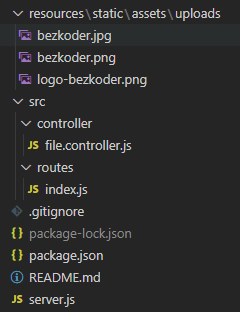In this tutorial, I will show you how to delete file in Node.js with unlink & unlinkSync method using Express for Rest API.
This tutorial is from BezKoder:
https://www.bezkoder.com/node-js-delete-file/
Node.js delete File with unlink
To delete a file in Node.js, we can use the unlink() function offered by the Node built-in fs module. The method doesn't block the Node.js event loop because it works asynchronously.
Here is an illustration showing how you can apply the technique:
const fs = require('fs');
fs.unlink(directoryPath + fileName, (err) => {
if (err) {
throw err;
}
console.log("Delete File successfully.");
});
Node.js delete File with unlinkSync
Another way to delete File in Node.js is using unlinkSync() (also provided by the Node built-in fs module). The Node.js event loop is blocked by this method until the action is finished. When you have many jobs running at once, it could harm performance.
const fs = require('fs');
try {
fs.unlinkSync('file.txt');
console.log("Delete File successfully.");
} catch (error) {
console.log(error);
}
Node.js delete File Rest API
Overview
Our Node.js Application will provide Rest API for deleting a File by its name:
DELETE /files/[filename]
This is the static folder that stores all uploaded files:
If you want to implement upload/download file REST APIs like this:
| Methods | Urls | Actions |
|---|---|---|
| POST | /upload | upload a File |
| GET | /files | get List of Files (name & url) |
| GET | /files/[filename] | download a File |
| DELETE | /files/[filename] | delete a File |
You can visit: Node.js File Upload/Download Rest API example
Technology
- express 4.18.1
- multer 1.4.4
- cors 2.8.5
Project Structure
This is the project directory that we're gonna build:
-
resources/static/assets/uploads: folder for storing uploaded files. -
file.controller.jsexports Rest API for deleting a File with url. -
routes/index.js: defines routes for endpoints that is called from HTTP Client, use controller to handle requests. -
server.js: initializes routes, runs Express app.
Setup Node.js Express File Upload project
Open command prompt, change current directory to the root folder of our project.
Install Express, CORS modules with the following command:
npm install express cors
Create Controller for file delete
In controller folder, create file.controller.js:
We will export remove() and removeSync() function that:
- use
fs.unlink/fs.unlinkSyncfunction for deleting file by its name - return response with message
const fs = require("fs");
const remove = (req, res) => {
const fileName = req.params.name;
const directoryPath = __basedir + "/resources/static/assets/uploads/";
fs.unlink(directoryPath + fileName, (err) => {
if (err) {
res.status(500).send({
message: "Could not delete the file. " + err,
});
}
res.status(200).send({
message: "File is deleted.",
});
});
};
const removeSync = (req, res) => {
const fileName = req.params.name;
const directoryPath = __basedir + "/resources/static/assets/uploads/";
try {
fs.unlinkSync(directoryPath + fileName);
res.status(200).send({
message: "File is deleted.",
});
} catch (err) {
res.status(500).send({
message: "Could not delete the file. " + err,
});
}
};
module.exports = {
remove,
removeSync,
};
Define Route for deleting file
When a client sends HTTP requests, we need to determine how the server will response by setting up the routes.
Here is route with corresponding controller method:
- DELETE
/files/[fileName]:remove()
Create index.js file inside routes folder with content like this:
const express = require("express");
const router = express.Router();
const controller = require("../controller/file.controller");
let routes = (app) => {
router.delete("/files/:name", controller.remove);
app.use(router);
};
module.exports = routes;
You can see that we use controller from file.controller.js.
Create Express app server
Finally, we create an Express server in server.js:
const cors = require("cors");
const express = require("express");
const app = express();
global.__basedir = __dirname;
var corsOptions = {
origin: "http://localhost:8081"
};
app.use(cors(corsOptions));
const initRoutes = require("./src/routes");
app.use(express.urlencoded({ extended: true }));
initRoutes(app);
let port = 8080;
app.listen(port, () => {
console.log(`Running at localhost:${port}`);
});
What we do are:
- import
expressandcorsmodules:- Express is for building the Rest apis
- cors provides Express middleware to enable CORS with various options.
- create an Express app, then add
corsmiddlewares usingapp.use()method. Notice that we set origin:http://localhost:8081. - listen on port 8080 for incoming requests.
Run & Check
First we need to create uploads folder with the path resources/static/assets and files.
On the project root folder, run this command: node server.js.
Let's use Postman to make HTTP DELETE request with a file name in url:
Check the result:
Conclusion
Today we've learned how to delete File in Node.js using unlink and unlinkSync method along with Express Rest API.
If you want to implement upload/download file REST APIs, please visit:
Node.js File Upload/Download Rest API example
Upload to GCS:
Google Cloud Storage with Node.js: File Upload example
You can also know way to upload an Excel file and store the content in MySQL database with the post:
Node.js: Upload/Import Excel file data into Database
If you want to upload images into database, you can find instructions at:
- Upload/store images in MySQL using Node.js, Express & Multer
- How to upload/store images in MongoDB using Node.js, Express & Multer
Happy Learning! See you again.
Source Code
You can find the complete source code for this tutorial on Github.























